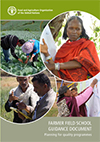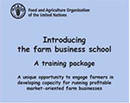Resources
The Farmer field school (FFS) approach has been, in its various forms and local adaptations, used worldwide for decades. It has become evident that FFS contribute not only to technical capacity of farmers but also significantly to community development including social dynamics, gender equality or social inclusion when talking about social vulnerabilities. Therefore, quality FFS represent a huge potential for the improvement of livelihoods of vulnerable groups and reduction of rural poverty by empowerment of rural communities.
In response to the growing number of orphans and vulnerable children, the Gender, Equity and Rural Employment Division (ESW) of the Food and Agriculture Organization of the United Nations (FAO), in close collaboration with the World Food Programme (WFP), has supported the development and implementation of Junior Farmer Field and Life Schools (JFFLS) in various countries of East and Southern Africa over the past several years. In the process, information and training materials have been developed, and reports produced.
The Farmer Field School (FFS) approach has been very successful and witnessed a strong expansion in many areas beyond crop production. Notwithstanding this success, the adoption of FFS in national extension often remains problematic and FFS activities have often been implemented in the margin of national institutions with strong reliance on donor funding. The creation of an enabling environment for institutional support is essential for expanding the effort, improving quality, and strengthening impact and continuity of the FFSs. This paper aims to analyse opportunities, challenges and implications of institutionalizing FFS at the national level.
The Farm Business School (FBS) was developed to assist extension workers, public or private, to more effectively work with farmers to provide them with the skills to respond to market demands. This publication comprises a collection of training materials that include: i) an orientation programme for policy makers and programme managers, ii) a short training (1 day or 7 days) for facilitators to set up and run farm business schools, (iii) a handbook aimed at providing guidance to trainers to design and implement the programme, and iv) a manual of training exercises.





